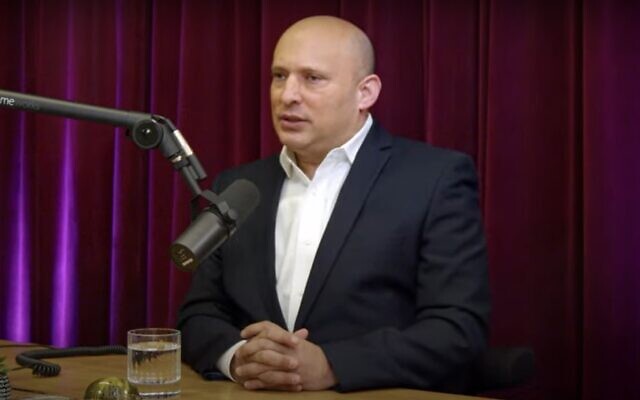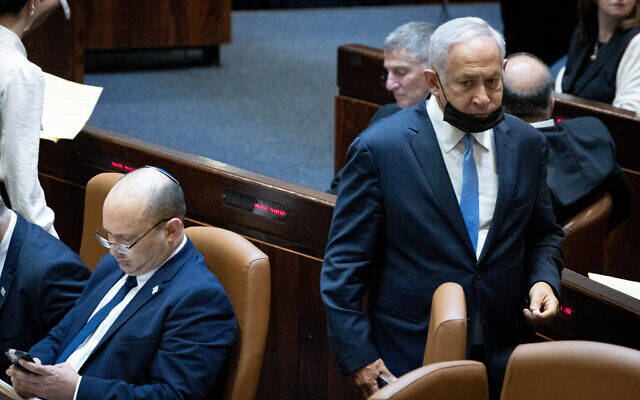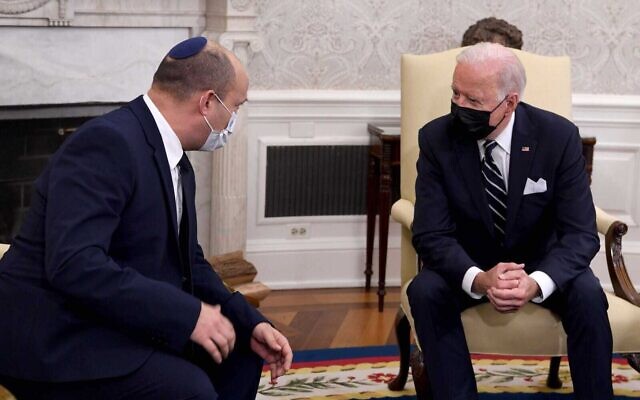Seven months after the end of his controversial term as prime minister and several months after stepping down from politics, Naftali Bennett broke his public silence with a wide-ranging, five-hour-long interview in which he acknowledged several mistakes he made in forming his ideologically diverse government, expressed alarm at the increasingly toxicity and divisiveness of Israeli politics, and urged the current government to stop acting “spitefully.”
Speaking with author and comedian Hanoch Daum, Bennett conditioned the interview on it being published in full. He posted the entire, hours-long conversation on his own YouTube channel on Saturday evening, with English subtitles.
While not saying so directly, Bennett gave the distinct impression that he intended to return to the political sphere in the future, discussing in depth the extraordinary story of his unlikely rise to power and his spectacular downfall after a year at the helm of the country.
Bennett — a nationalist, religious prime minister whose Yamina party only won six seats in the 120-member Knesset — joined forces with left-wing, centrist and other right-wing politicians in 2021 to form a first-of-its-kind coalition that included parties with conflicting worldviews, including an Arab Islamist party, Ra’am.
The move, which ousted Benjamin Netanyahu from the premiership after 12 years in office and followed an unprecedented political crisis that saw four successive national elections in under three years, made Bennett a pariah among much of the right wing for breaking a central election promise, and heralded a ceaseless, fiery campaign against him and his slim-majority power-sharing government with Yesh Atid leader Yair Lapid. Eventually, members of Bennett’s party succumbed to the pressure and toppled the government.
Get The Times of Israel's Daily Edition by email and never miss our top stories
Netanyahu’s bloc of loyalists won the subsequent election this past November — in which Bennett did not run — and formed a hardline government with far-right parties. The current coalition is championing a sweeping judicial overhaul that critics say would undermine Israel’s democratic foundations.

Former prime minister Naftali Bennett during an interview published February 4, 2023. (Screenshot: YouTube; used in accordance with Clause 27a of the Copyright Law)
In his interview, Bennett said that despite the events of the past few years, he retains the same views, although his priorities have changed.
“My emphasis today is unity, more moderation, and proactiveness. Lots of action, less talk,” he said.
He said he harbors no animosity toward Netanyahu, although he no longer admires him as he did in the past.
Bennett said he understood the anger and sense of betrayal felt by many of his voters over his decision to break his express promise to not form a government with Lapid and the left. He said he had genuinely stood behind the promise at the time, but was left with an impossible choice between forming such an “unnatural” government and sending the country to yet another election, extending the severe political crisis and potentially throwing the country “into the abyss.”
Bennett admitted that he had made a mistake in pledging not to sit with Lapid. But he insisted repeatedly that his decision to form the government had been the right one for Israel, and was motivated solely by genuine care for the country and not at all fueled by personal ambition or a desire to unseat Netanyahu, as the current premier and his loyalists repeatedly charge.

Prime Minister Naftali Bennett, Foreign Minister Yair Lapid, President Reuven Rivlin and ministers pose for a group photo of the newly sworn in government at the President’s Residence in Jerusalem, June 14, 2021. (Yonatan Sindel/Flash90)
The former premier also acknowledged that the composition of his government “wasn’t right,” that the Israeli public was not currently able to accept an Arab party as part of the coalition, and that he had made a mistake in including only predominantly Ashkenazi-led Jewish parties and not other elements of society. The latter, he said, sidelined the socioeconomically weaker Sephardi population and played into the image of joining forces with the social elite and ousting the marginalized community’s leader, Netanyahu.
“I had set up a coalition with Labor, Meretz, Yesh Atid — seen as secular Ashkenazi… It’s not just that I ousted Netanyahu; from this point of view, I joined forces with those who had repressed them all these years, and booted the man who had defended them,” Bennett said. “Netanyahu is long since not a man but a figurehead; like the Star of David, or the menorah, a symbol of the state… and I had ‘joined forces with the elite.'”
Another mistake he made was neglecting to consolidate support for his government within his own party, which ultimately saw MKs breaking ranks and causing its downfall. “There were several errors; one of them was lacking involvement in the political aspect,” he said.
Bennett also admitted that he had underestimated the effectiveness of the “poison machine” directed against him and his government, adding that such a campaign has also been directed against Netanyahu since he first assumed a leadership role in the 1990s.

Opposition Likud party leader Benjamin Netanyahu (left) walks next to Prime Minister Naftali Bennett during the vote on the state budget, in the Knesset on November 4, 2021. (Yonatan Sindel/Flash90)
The Netanyahu-led opposition, Bennett charged, had broken the unwritten rules of the game and taken action that “simply isn’t done” — like voting against crucial pieces of legislation that it ideologically supports, such as the periodic extension of emergency regulations defining Israel’s military rule over the West Bank.
In contrast, he claimed, Bennett made a point of showing Netanyahu respect. As an example, he said he had offered the Likud leader the prime minister’s chair during their handover meeting, even though he was no longer premier, a day after Bennett assumed power.
Bennett said Netanyahu had withheld much information from him during the handover meeting, which famously lasted only 20 minutes. He said there was much material he needed to find elsewhere through tedious work and from other officials.
Recounting his actions as prime minister on the international stage, Bennett detailed what he said were concessions by Russian and Ukrainian leaders during his mediation on Russia’s invasion, saying Vladimir Putin had promised him not to assassinate his Ukrainian counterpart, Volodymyr Zelensky, while the latter had backed down from joining NATO.

Prime Minister Naftali Bennett, left, speaks as he meets with US President Joe Biden in the Oval Office of the White House, on August 27, 2021, in Washington, DC. (GPO)
He also hinted that he had preserved Israel’s freedom to take military action against Iran’s nuclear program without prior coordination with the United States.
During a meeting with US President Joe Biden in Washington, Bennett said, the president had asked him “to promise me that you’ll update me on any action you take in Iran… And I answered: ‘Mr. President, there are going to be times when you’re not going to want to know about things, but generally speaking, I’ll keep you in the picture on the broad strokes of things.'”
Biden “completely understood” what he meant, Bennett said.
Speaking of the current government’s judicial overhaul plans and the intense opposition to them, Bennett expressed concern at the loss of dialogue over key matters.
“People are afraid of this. There is a real fear that the country is lost,” Bennett said, adding that he worried that “people will stop sending their children to [IDF] combat units” in protest.
Giving a piece of advice to the leaders of the current government, Bennett urged them “not to act power-drunk” since that would “backfire,” quoting Winston Churchill who said: “In defeat, defiance, in victory, magnanimity.”
“Be magnanimous. The members of the left aren’t enemies. They’re our people, our brothers. Don’t trample anyone, don’t be spiteful. What do you achieve by doing that? Do you want the high-tech [sector] and scientists to flee overseas?”


